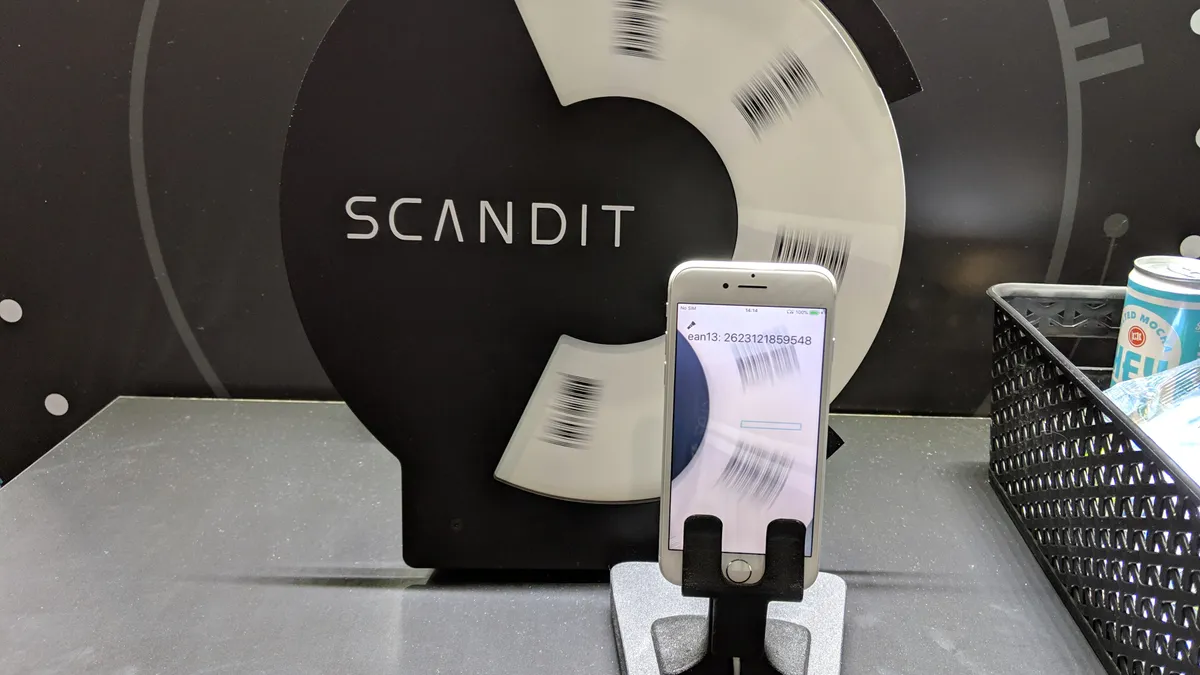The ongoing digital transformation in grocery has created a feeding frenzy for technology vendors. This was clear walking the exposition floor at the National Retail Federation's Big Show in New York, where companies promoted everything from digital shelves to augmented reality apps aimed at helping retailers compete with the likes of Amazon and Walmart. Here are five of the most interesting technologies from the show.
-
Digital shelves
Krishna ThakkerKroger has made headlines with its digital EDGE shelves, but that technology isn't exclusive to the U.S.'s largest supermarket chain. SFD Systems, which has worked with Waitrose and Morrisons in the U.K., was one of a few companies at NRF hoping to bring its digital shelves to American retailers.
The shelves enable retailers to quickly change prices and offer promotional information, said Chris Brown, SFD's CEO. The system also gives grocers the ability to partner with brands to show advertisements on each display. The LCD lights and flashing ads can attract customers’ attention and gives them a more engaging in-store shopping experience, Brown noted. This can bring in additional revenue for retailers through advertising dollars, as well as an increase in sales and less revenue lost to inaccurate prices.
-
Augmented reality
Augmented reality is a fringe technology for most grocers at this point, but that could change as companies like Walmart invest in it. Scandit’s AR technology, which integrates with retailers' apps, gives consumers a way to shop for specific dietary needs. Customers can open the app, choose an ingredient or an allergen, and hover the device over the shelf. The phone will scan each barcode instantly and place a green checkmark over those products that are OK for the customer to purchase.
In addition, the customer can hover his or her handheld device over the shelf to quickly find all the products on a shopping list. This could be useful to retailers that offer grocery pickup, said Brandon Watts, a spokesman for Scandit, with pickers able to quickly identify products as they walk through store aisles.
-
In-store robotics
Krishna ThakkerFrom Walmart to Ahold Delhaize’s Giant and Stop & Shop, retailers are rolling out in-store robots, and startups like Bossanova are hoping more grocers take on the investment.
Bossanova currently has 50 robots scanning shelves at Walmart stores. Over time, the machine analyzes the data to help Walmart order just the right amount of products, specifically in the grocery aisle where foods can quickly expire. Bossonova reps said that by taking over this task, it gives the retailer’s associates more time to focus on customer service. Walmart is also rolling out floor-scrubbing robots to hundreds of stores.
On Monday, Ahold Delhaize announced it will expand its in-store robot named Marty to approximately 500 Giant/Martin’s and Stop & Shop stores. With googly eyes meant to put customers at ease, Marty, manufactured by Badget Technologies, scans shelf stocks and can identify spills and other aisle hazards. Meanwhile, last October Schnuck Markets announced it would put shelf scanning robots named Tally in 15 of its stores. Tally was created by San Francisco-based startup Simbe Robotics.
-
Scan-and-go technology
Krishna ThakkerSince Amazon Go's debut last year, scan-and-go technology has been on the rise. And judging by the numerous startups centered around this technology, the trend isn't cooling down anytime soon.
Interestingly, not all the of the companies offered a uniform take on checkout-free payment. Companies like NCR, well-known for being the inventor of the electronic cash register and for developing self-checkout machines, presented a solution that integrates with a retailer’s app and allows consumers to scan their products as they go— and, if they are loyalty members, check out, too. The company also provides the retailer and consumers with handheld devices.
Other well-known tech companies presenting similar technology include Alibaba’s Hema market, which integrates in-store scanning with online ordering, and Caper, an AI-powered smart cart company that allows customers to scan products in their carts.
-
Amazon Go 2.0
Amazon Go has made headlines with its checkout-free stores currently operating in Seattle, Chicago and San Francisco. But as with Kroger and its digital shelves, this innovative technology isn't exclusive to the retailer. AiFi, a startup founded by two former Google and Apple developers, has taken the concept a step further with micro stores that let shoppers scan in with an app or a credit card, grab the products they want, then walk out.
AiFiIn an interview with Grocery Dive, AiFi CEO and co-founder Steve Gu said its "nano" stores, which at 160 square feet are roughly the size of a shipping container, are a white-label solution that can partner with a variety of retail formats, including supermarkets. The locations, which use camera sensors and shelf weights to detect product selections, can fit inside office buildings, airports, schools and even other retail stores, Gu said. He also noted that retailers could bolt a micro-market on to an existing store to offer 24-hour service.
At the show, AiFi announced it has partnered with Żabka, the largest convenience store chain in Central and Eastern Europe, to create a prototype store.
"You can think of the nano store as a walk-in vending machine, but also similar in format to a convenience store," Gu said.













